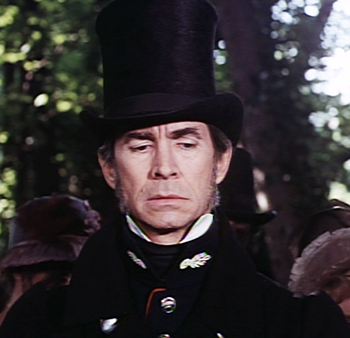Javert
May 13, 2014 8:11:25 GMT
Post by Javert on May 13, 2014 8:11:25 GMT
JAVERT
"it is very easy to be kind. the difficulty lies in being just".

I can see your protestations
As merely manipulations
What you feel is not the issue
You're so polite I want to hit you
And hope that you'll retaliate
And prove my fears legitimate
I'd like to thank you, though it's trite,
For assuring me I'm always right
"it is very easy to be kind. the difficulty lies in being just".

I can see your protestations
As merely manipulations
What you feel is not the issue
You're so polite I want to hit you
And hope that you'll retaliate
And prove my fears legitimate
I'd like to thank you, though it's trite,
For assuring me I'm always right

Given Name: Javert
Nickname(s): n/a
Gender: Male
Sexuality: Bisexual homoromantic
Age: 52
Race: Human (French/Roma)
Home Town: Paris, France
Fandom: Les Misérables
Canon or Original: Canon

Character Portrayal: Anthony Perkins
Hair: Dark brown, close to black. Long, comes past his shoulders, worn in a ponytail.
Eyes: Grey
Height/build: 6’1”, broad-shouldered, large.
Individual Features: Javert is often described in animalistic terms and indeed there is something of the predator in his looks. The wolf is in his eyes; the tiger in his laugh. He always seems to be frowning, whatever the circumstance. If this is his general state of being, however, it is not the only expression ever found on his features. He is not often genuinely angered. Irritated, annoyed, yes, but true rage on this face is terrible to behold, and it is a subtle but profound change. There is very little sign of it, outwardly; something as minor as an out-of-place cravat may indicate it. But his demeanor, as impossible as it seems, is like night and day—from cool, calm, if harsh authority to an avenging archangel yet without much of a shift in expression.
In terms of basic appearance, he is tall and also large, with broad shoulders and hands to match. He has long dark hair pulled back in an immaculate ponytail. In fact, everything about him is perfectly in order; it's when something is out of place that shows something is wrong. He is always meticulous, though not fashionable, in his dress and though his pay is now enough to warrant replacement when needed, he retains the habit of wearing his clothes until they are no longer serviceable. He wears a black topcoat and this is almost always the extent of what anyone sees, that and his grey eyes searching their face above a forest of whiskers and below the brim of a top hat. He carries a heavy lead-topped cane.
Powers: n/a

Family: His father was a convict, his mother a fortune-teller. He has no idea if either are still living, nor does he care.
Friends: n/a
Enemies: Criminals in general.
Occupation: Inspector, first class

Personality: The core of Javert's character is unswerving loyalty—not to an individual person, but to an ideal. To him the law is alpha and omega, an absolute that cannot be broken or bent for any reason. It is the mechanism by which order is maintained and society is guarded from evil. As its self-appointed watchdog, he guards it from those he views as its attackers. Entire classes of people fall into this abyss regardless of actual criminality. Bohemians, the poor, the itinerant, anyone on the outskirts of society, all are inherently suspect. He is too scrupulous to accost them against the tide of doubt, but he hates them nonetheless.
He hates them because in the end he is one of them. His ancestry is such that he could easily have been a criminal himself. Between this knowledge and his strict expectations for himself as well as others, he never lets himself forget this. It's not the strongest reason he comes across as unlikable to most, but it certainly doesn't help. He has absolutely no need for friends. On the rare occasion that it happens, it is connected to his work one way or another and he is never the instigator. Mostly it comes about from mutual respect between colleagues.
If he is capable of respecting a peer, with a superior he is capable of little else. The law is his Bible, its magistrates his bishops. To Javert they are infallible. It takes a great deal for him to countermand them, to assert his own authority. He has come more into his own in Paris, but remains acutely aware of his boundaries. Within those boundaries he is the epitome of confidence to an extreme degree. He is so sure of his rectitude that it has translated into the universe as his accomplice justly conspiring to move events in his direction. To the outside observer perhaps it has made him reckless.
He has some slight connection to the rest of humanity in that his demeanor changes dependent on who he's talking to. Always brisk, never particularly tactful, he nevertheless displays a range in his uncouthness from subtle disdain to cordial enmity with his criminal prey. His sense of humor—present though rarely accompanied by a laugh of his own—is strange, even morbid. But with his superiors and any in authority, he is never less than correct.
Likes:
+ Catching criminals
+ The stars
+ Snuff
+ Being right
+ Certainty
+ Anyone in authority
Dislikes:
+ Criminals
+ Bohemians and the lower classes
+ Revolutionaries
+ Books
+ Gamins
+ Lying
Fears:
+ Failure
+ Making a mistake
+ Chaos

History:
As the son of a convict and a fortune-teller, Javert did not have a very promising start in life. Statistics said he should have wound up a criminal like his parents, or at least somewhere on the lower rungs of life’s ladder. However, statistics didn’t account for the character of Javert. Early on, he saw that it boiled down to two types of people: those who attacked society, and those who guarded it. He chose the latter and in doing so, charted the path for the rest of his life.
As a young man he served as a guard in the prisons of southern France. Among these was the prison at Toulon, where he remained long enough to earn the title of adjutant-guard. Then in 1818 thanks to the patronage of M. Chabouillet of the Paris prefecture of police, he was appointed inspector in the town of M. sur M. This town had three years earlier undergone a complete transformation thanks to the ingeniousness of one man, known as Madeleine.
From the beginning Javert suspected this man, who’d arrived in town with nothing—apparently not even papers, but no one had bothered to ask him because that same night he’d rescued the captain of the gendarmes’ children from a fire. And after that he’d come up with an ingenious change to the manufacture of black beads, which was the town’s main industry, that instantly made it much more profitable. It was by this he made his fortune and also the town’s. Nearly everyone in M. sur M. came to adore him. But not Javert.
He cherished his suspicions and quietly nosed around to see what he could do to substantiate them. This man resembled a certain convict he’d supervised in Toulon. And the more he looked into it the more convinced Javert became. Monsieur Madeleine—who had in the meantime become Monsieur le Maire, no less—was none other than this Jean Valjean. However, he had no proof, not even after he witnessed the mayor single-handedly lift a cart, a feat which he knew only one man to be capable of, that same convict.
It wasn’t until the incident with the prostitute Fantine that things reached a tipping point for the inspector. He arrested Fantine on the word of a dandy of the town, whom Javert believed rather than the woman because she was no one and he was a citizen, he owned property. The mayor intervened and insisted the woman be released. Javert, who never resisted authority, dared to do so in this case, but again was thwarted by Madeleine and forced to retreat. In anger over this, he finally acted, denouncing the mayor at Paris as the parole-breaker and recidivist thief Jean Valjean.
He received the response that he must be crazy, because Jean Valjean had already been caught and was awaiting trial in the nearby town of Arras. He was so sure of himself that he had to go and see with his own eyes, but sure enough, there was the old rogue languishing in a cell, cleverly pretending to be someone else. But like four of the man’s fellow convicts before him, Javert recognized him. That being the case, he had committed a grave offense against the mayor of M. sur M. and he went immediately to the man to request his dismissal. Madeleine insisted he remain at his post, however.
Javert didn’t suspect anything was amiss. He went to Arras to give his testimony, then returned to M. sur M. The next day, he received astonishing news—after he’d left the court, Madeleine had arrived and declared himself to be the real Jean Valjean. He had proved it to the satisfaction of all present by giving details of the four convicts who’d originally (mis)identified the man called Champmathieu, details that only another convict could know. So, Javert sought him out immediately, taking with him a tiny contingent of soldiers to the hospital where he was visiting the woman Fantine. During the ensuing confrontation, the woman died of shock and Jean Valjean managed to escape.
Javert tracked him to Paris, the maelstrom where so many criminals went to disappear. It took him months, but finally he found him, living in a secluded house with Fantine’s eight-year-old child. Unfortunately the wily convict evaded him again; he couldn’t even tell how. Javert and his associates had him dead to rights, or so the inspector thought—but then he just vanished. He continued searching the neighborhood where he’d lost the trail for a month, but with no luck. He had to give up eventually, but to be sure if he caught the scent of the man again, the hunt would be on.
Eight years later and Paris had become a hotbed of revolutionary thoughts. The city had been temporarily disturbed by the troubles of 1830, which gave to France the July Monarchy, but since then things had been relatively quiet—in no small part due to the efforts of the police, especially the political division. These police spies, known as the Sûreté, moved throughout the population, especially the incendiary class of students, keeping their ear to the ground for signs of impending revolution. As the year of 1832 progressed it seemed more and more likely, but until the death of General Lamarque at the beginning of June, nothing materialized. Throughout this time Javert continued as inspector and agent of the Sûreté, waiting along with the rest of Paris for conflagration to begin.
Random Facts:
+ He hates books but reads them anyway. Otherwise he doesn’t read the newspapers except when there’s news about the monarchy.
+ He is very good at disguises and learns languages easily.
+ He is an agnostic and though he holds the church and its authority figures in the highest respect, he has no deity but the law.
+ His reward for a good day’s work, when he thinks he’s earned it, is a pinch of snuff.

Name/alias: Levi
Age: 27
RP Experience: Way too much
Any Other Characters?: Nope.
RP Sample:
"Tell me what happened. Be quick about it."
Javert's diction—precise, to the point, yet not without the occasional spice of a man who is not completely uneducated—was in no way an accident. It was carefully built up of all his five decades of experience and modeled only after those he respected implicitly. The thieves and scoundrels he was born among, he retained their argot perfectly but used it only in the presence of that species of man, to play the spy or to communicate the ungentle suggestion that they were under arrest. With everyone else he was correct to the point that the more linguistically aware might notice.
The man he was listening to at the moment was not likely to, since he had also missed seeing what went on right under his nose: a murder, and not a small one. But he just threw up his hands, still dusted with the flour that was a mark of his baker's trade, and continued to babble. He'd been checking the loaves, there was one that hadn't risen and so he was preoccupied... Preoccupied! With the racket that must have ensued? When they'd arrived on the scene, it was as bad an affair as he'd ever seen. The victim had put up a decent fight. He'd lost in the end, but the perpetrator hadn't had an easy time of it.
There must have been screams too, unless all those wounds were made after death. The corpse had multiple wounds and any one of them could have been the final blow. Javert stared hard at the scrawny baker. He couldn't be the murderer, but perhaps he was mixed up in it somehow. Too obvious a suspicion, however, could put the scent into the air and warn the hare. Javert's tone remained neutral as he put questions to the baker, teasing out inconsistencies, unraveling the spider's web until he finally had the real story of what had happened.
With a little patience (he had just enough) and a little strategy, Javert found the baker a cell at La Force. Now all that remained was to find his accomplice. And armed with the supreme confidence of authority in its most acute state of rectitude, he knew it was only a matter of time.
This template was made by me, Grimm.
Don't steal shit. Mashed lyrics from repo! the genetic opera.
Don't steal shit. Mashed lyrics from repo! the genetic opera.





